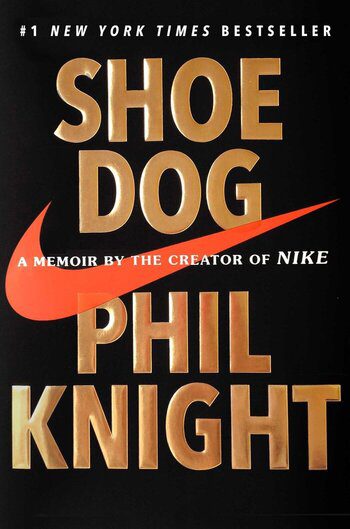Life is growth, Business is growth. You grow or you die.
In Shoe Dog: A Memoir by the Creator of Nike, co-founder and chairman emeritus of Nike, Inc., Phil Knight describe the early days of Nike as Blue Ribbon Sports reselling Japanese shoes, his partnership with his coach (Bill Bowerman), the early challenges of building the brand, and its evolution into one of the world’s most iconic, game-changing, and profitable brands.
Co-founder of Microsoft, Bill Gates listed Shoe Dog as one of his favorite books of 2016. Bill Gates on Shoe Dog ” An honest tale of what it takes to succeed in business. Phil Knight opens up in a way few CEOs do in his candid memoir about creating the Nike shoe empire.”. In his 2016 annual letter to shareholders, chairman and CEO of Berkshire Hathaway, Warren Buffet had high praises for the Shoe Dog book : “The best book I read last year was Shoe Dog, by Nike’s Phil Knight. Phil is a very wise, intelligent and competitive fellow who is also a gifted storyteller.”
Fresh out of business school, Phil Knight borrowed fifty dollars from his father and launched a company with one simple mission: import high-quality, low-cost running shoes from Japan. Selling the shoes from the trunk of his car in 1963, Knight grossed eight thousand dollars that first year.
With humble beginnings, Nike is today the world’s largest supplier of athletic shoes and apparel and with revenue of $44.5 billion in its fiscal year 2021 (ending May 31, 2021). 1
Favourite Takeaways from Shoe Dog by Phil Knight.
In 1964, Phil Knight and his former University of Oregon track coach, Bill Bowerman started Blue Ribbon Sports as an enterprise for selling Japanese running shoes (Onitsuka Tiger later renamed Asics). They both put up $500 to start the Nike brand which as of January 2022 has a market capitalization of $226.04 Billion, making Nike the world’s 43th most valuable company by market cap. 2
Don’t tell people how to do things, tell them what to do and let them surprise you with their results. – George Patton
Trying to figure it out
At different times I’d fantasized about becoming a great novelist, a great journalist, a great statesman. But the ultimate dream was always to be a great athlete. Sadly, fate had made me good, not great. At twenty-four I was finally resigned to that fact. I’d run track at Oregon, and I’d distinguished myself, lettering three of four years. But that was that, the end.”
Now, as I began to clip off one brisk six-minute mile after another, as the rising sun set fire to the lowest needles of the pines, I asked myself: What if there were a way, without being an athlete, to feel what athletes feel? To play all the time, instead of working? Or else to enjoy work so much that it becomes essentially the same thing.
What if there were a way, without being an athlete, to feel what athletes feel? To play all the time, instead of working?
The Crazy Ideas
At twenty-four I did have a Crazy Idea, and somehow, despite being dizzy with existential angst, and fears about the future, and doubts about myself, as all young men and women in their midtwenties are, I did decide that the world is made up of crazy ideas. History is one long processional of crazy ideas. The things I loved most—books, sports, democracy, free enterprise—started as crazy ideas.
Like it or not, life is a game. Whoever denies that truth, whoever simply refuses to play, gets left on the sidelines.
On Running
For that matter, few ideas are as crazy as my favorite thing, running. It’s hard. It’s painful. It’s risky. The rewards are few and far from guaranteed. When you run around an oval track, or down an empty road, you have no real destination. At least, none that can fully justify the effort. The act itself becomes the destination. It’s not just that there’s no finish line; it’s that you define the finish line. Whatever pleasures or gains you derive from the act of running, you must find them within. It’s all in how you frame it, how you sell it to yourself.
The act itself becomes the destination. It’s not just that there’s no finish line; it’s that you define the finish line.
Every runner knows this. You run and run, mile after mile, and you never quite know why. You tell yourself that you’re running toward some goal, chasing some rush, but really you run because the alternative, stopping, scares you to death.
The cowards never started and the weak died along the way. That leaves us, ladies and gentlemen. Us.
The Self is the Enemy
In every religion, it seemed, self is the obstacle, the enemy. And yet Zen declares plainly that the self doesn’t exist. Self is a mirage, a fever dream, and our stubborn belief in its reality not only wastes life, but shortens it. Self is the bald-faced lie we tell ourselves daily, and happiness requires seeing through the lie, debunking it. To study the self, said the thirteenth-century Zen master Dogen, is to forget the self. Inner voice, outer voices, it’s all the same. No dividing lines.
You cannot travel the path until you have become the path yourself. – Buddha
Fail Fast
Starting my own business was the only thing that made life’s other risks—marriage, Vegas, alligator wrestling—seem like sure things. But my hope was that when I failed, if I failed, I’d fail quickly, so I’d have enough time, enough years, to implement all the hard-won lessons. I wasn’t much for setting goals, but this goal kept flashing through my mind every day, until it became my internal chant: Fail fast.
Power of Visualization
WE FOUND A house in Beaverton. Small, only sixteen hundred square feet, but it had an acre of land around it, and a little horse corral, and a pool. There was also a huge pine tree in the front and a Japanese bamboo out back. I loved it. More, I recognized it. When I was growing up my sisters asked me several times what my dream house would look like, and one day they handed me a charcoal pencil and a pad and made me draw it. After Penny and I moved in, my sisters dug out the old charcoal sketch. It was an exact picture of the Beaverton house.
Shoe Dogs
The average person takes seventy-five hundred steps a day, 274 million steps over the course of a long life, the equivalent of six times around the globe—shoe dogs, it seemed to me, simply wanted to be part of that journey. Shoes were their way of connecting with humanity. What better way of connecting, shoe dogs thought, than by refining the hinge that joins each person to the world’s surface?
When sports are at their best, the spirit of the fan merges with the spirit of the athlete, and in that convergence, in that transference, is the oneness that the mystics talk about.
Demand and Supply
Supply and demand is always the root problem in business. It’s been true since Phoenician traders raced to bring Rome the coveted purple dye that colored the clothing of royals and rich people; there was never enough purple to go around. It’s hard enough to invent and manufacture and market a product, but then the logistics, the mechanics, the hydraulics of getting it to the people who want it, when they want it—this is how companies die, how ulcers are born.
Fear of failure, I thought, will never be our downfall as a company. Not that any of us thought we wouldn’t fail; in fact we had every expectation that we would. But when we did fail, we had faith that we’d do it fast, learn from it, and be better for it.
- It’s just business.” It’s never just business. It never will be. If it ever does become just business, that will mean that business is very bad.
- Beating the competition is relatively easy. Beating yourself is a never-ending commitment.
- Oneness—in some way, shape, or form, it’s what every person I’ve ever met has been seeking.
You measure yourself by the people who measure themselves by you. – The Bucket List Movie
- Whether you have it or not, whether you want it or not, whether you like it or not, it will try to define your days. Our task as human beings is not to let it.
All the Best in your quest to get Better. Don’t Settle: Live with Passion.



3 Comments
Pingback: Top Quotable Quotes from Phil Knight's Biography - Shoe Dog. | Lanre Dahunsi
Pingback: 50 Biography Reading Challenge. | Lanre Dahunsi
Pingback: 100 Books Reading Challenge 2022. | Lanre Dahunsi